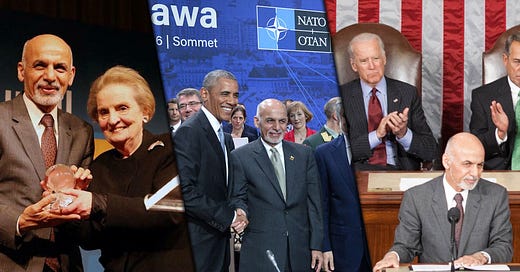How elite US institutions created Afghanistan’s neoliberal President Ashraf Ghani, who stole $169 million from his country
Before he stole $169 million and fled his failed state, Afghanistan’s puppet President Ashraf Ghani was formed in elite universities, given US citizenship, trained in neoliberalism at the World Bank.
No individual is more emblematic of the corruption, criminality, and moral rot at the heart of the 20-year US occupation of Afghanistan than President Ashraf Ghani.
As the Taliban took over his country this August, advancing with the momentum of a bowling ball rolling down a steep hill, seizing many major cities without firing a single bullet, Ghani fled in disgrace.
The US-backed puppet leader allegedly made his escape with $169 million that he stole from the public coffers. Ghani reportedly crammed the cash into four cars and a helicopter, before flying to the United Arab Emirates, which granted him asylum on supposed “humanitarian” grounds.
The president’s corruption had been exposed before. It was known, for instance, that Ghani had brokered shady deals with his brother and US military-linked private companies, letting them tap into Afghanistan’s estimated $1 trillion in mineral reserves. But his last-minute exit represented an entirely new level of treachery.
Ghani’s senior aides and officials promptly turned on him. His defense minister, General Bismillah Mohammadi, wrote on Twitter in disgust, “They tied our hands behind our backs and sold the homeland. Damn the rich man and his gang.”
While Ghani’s dramatic desertion stands out as a stark metaphor for the depravity of the US-NATO war in Afghanistan – and how it made a handful of people very, very rich – the rot goes much deeper. His rise to power was carefully managed by some of the most esteemed and well-heeled think tanks and academic institutions in the United States.
Indeed, Western governments and their stenographers in the corporate media enjoyed a veritable love affair with Ashraf Ghani. He was a poster boy for the exportation of neoliberalism to what had been Taliban territory, their very own Afghan Milton Friedman, a faithful disciple of Francis Fukuyama – who proudly blurbed Ghani’s book.
Washington was thrilled with Ghani’s reign in Afghanistan, because it had finally found a new way to implement Augusto Pinochet’s economic program, but without the PR cost of torturing and massacring droves of dissenters in stadiums. Of course, it was the foreign military occupation that replaced Pinochet’s death squads, concentration camps, and helicopter assassinations. But the distance between Ghani and his neocolonial protectors helped NATO market Afghanistan as a new model for capitalist democracy, one that could be exported to other parts of the Global South.
As South Asia’s version of the Chicago Boys, the US-educated Ghani believed deeply in the power of the free market. To advance his vision, he founded a Washington, DC-based think tank, the “Institute for State Effectiveness,” whose slogan was “Citizen-Centered Approaches to State and Market,” and which was expressly dedicated to proselytizing the wonders of capitalism.
Ghani clearly spelled out his dogmatic neoliberal worldview in an award-winning book rather comically titled “Fixing Failed States.” (The 265-page tome uses the word “market” a staggering 219 times.) It would be impossible to overstate the irony, then, of the state he personally presided over immediately failing mere days after a US military withdrawal.
The instantaneous and disastrous disintegration of the US puppet regime in Kabul sent Western governments and mainstream reporters into a frenzy. As they frantically looked for people to blame, Ghani stood out as a convenient scapegoat.
What went unsaid was that these same NATO member states and media outlets had for two decades lavished praise on Ghani, depicting him as a noble technocrat who was bravely fighting corruption. They had long been the Afghan president’s eager patrons, but threw him under the bus when he outlived his usefulness, finally acknowledging that Ghani was the treacherous crook he had always been.
The case is instructive, for Ashraf Ghani is a textbook example of the neoliberal elites whom the US empire hand picks, cultivates, and installs in power to serve its interests.
READ MORE AT THEGRAYZONE.COM





